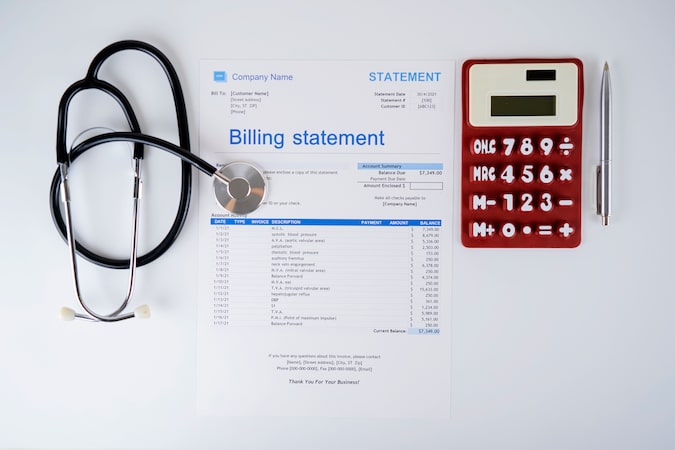
Understanding Hospital Bills and Charges: How to Decipher and Negotiate

Hospital bills can be overwhelming, but understanding the breakdown of charges and identifying errors can help save you money. Learn how to read your bill, avoid common errors, and negotiate better payment options.
Navigating hospital bills can feel like solving a puzzle. Between the medical jargon, billing codes, and insurance paperwork, it’s easy to get confused. However, taking the time to understand your bill and looking out for potential errors can prevent you from overpaying and help you manage costs. Here’s how to do it.
For those looking for comprehensive coverage options, SelfGood offers health insurance solutions tailored to individual needs.
Key Takeaways:
- Hospital bills are often complicated, and errors are common.
- Reviewing an itemized bill is key to identifying unnecessary or duplicate charges.
- You can negotiate hospital bills, even if you have insurance, to lower costs or set up payment plans.
- Resources like FAIR Health and Healthcare Bluebook can help you compare charges to ensure you’re paying fair prices.
How to Break Down a Hospital Bill

Understanding your hospital bill is the first step to managing it effectively. Hospitals typically issue two types of bills: itemized and summary bills. Anitemized billlists each service, test, and medication individually, while asummary billgives only the total costs without details. It’s important to request an itemized bill if you receive a summary version, as this allows you to review each charge.
Key Sections of a Hospital Bill:
- Explanation of Benefits (EOB):This document from your insurance company outlines what your insurance covers and what you owe. Ensure the EOB matches the hospital bill12.
- CPT Codes:These billing codes correspond to medical services. If a charge looks unfamiliar, verify the CPT code to confirm you were billed for the correct service13.
- Charge Description Master (CDM):The CDM lists hospital-specific prices for services. Prices vary between hospitals, so you can often negotiate using CDM prices as leverage4.
Common Billing Errors and How to Spot Them
Mistakes on hospital bills are surprisingly common and can result in overcharges. Some of the most frequent errors include:
- Duplicate Charges:Review your bill carefully for any services or medications that appear more than once3.
- Upcoding:This happens when a provider charges for a more expensive service than the one you received5.
- Cancelled Services:Be sure that you aren’t billed for tests or procedures that were scheduled but later cancelled1.
If you notice any of these errors, contact the hospital’s billing department immediately to dispute them. It’s helpful to keep a record of your communications with hospital staff, including dates and the names of the people you spoke with.
How to Dispute Billing Errors
If you find a billing mistake, here’s a step-by-step guide to dispute it:
- Gather Documentation:Keep all relevant paperwork, including your hospital bill, EOB, and any medical records that support your claim.
- Contact the Billing Department:Speak to the billing office and explain the error. Most hospitals are willing to correct mistakes if you provide evidence6.
- File a Formal Dispute:If the billing office doesn’t resolve the issue, you can file a formal dispute with your insurance provider or hire a medical billing advocate to assist1.
Negotiating Hospital Bills for Lower Costs

Many patients are unaware that hospital bills are negotiable, but taking the time to negotiate can save you a significant amount of money. Even if you have insurance, there may be room for negotiation on the portion of the bill that insurance doesn’t cover.
Tips for Successful Negotiation:
- Offer a Lump-Sum Payment:Hospitals are often willing to reduce your bill if you can pay a large portion of it upfront5.
- Request a Payment Plan:If a lump sum isn’t feasible, ask to spread your payments out over time with a payment plan. Ensure you understand the terms before agreeing3.
- Use Price Comparison Tools:Websites like Healthcare Bluebook and FAIR Health allow you to compare typical charges for medical procedures in your area. Use this information to negotiate if your bill seems excessive16.
Payment Plans and Financial Aid Options
If paying your hospital bill all at once isn’t possible, many hospitals offer payment plans that allow you to spread out the cost over several months. It’s important to carefully review the terms of the payment plan, including any interest rates or fees.
In addition to payment plans, hospitals often providefinancial aid programsfor patients who are unable to pay their bills. Eligibility criteria vary by hospital, but these programs can reduce or even eliminate your outstanding balance if you qualify65.
Final Thoughts
Hospital bills can be complex, but with the right approach, you can understand your charges, spot errors, and negotiate better payment options. Taking the time to review your bill and engage in proactive negotiations could save you hundreds or even thousands of dollars. Remember, you have the right to question your bill and seek financial assistance if needed.
Frequently Asked Questions
What should I look for in an itemized bill?
In an itemized bill, check for duplicate charges, incorrect dates of service, or unfamiliar medications or procedures. If something seems off, contact the billing department for clarification1.
What should I do if my insurance denies a claim?
If your insurance denies a claim, contact your insurer to understand the reason. You may need to submit additional documentation or appeal the denial if you believe the service should be covered3.
Can I negotiate my hospital bill even if I have insurance?
Yes, you can negotiate the portion of the bill that isn’t covered by insurance. Hospitals are often willing to work with you to reduce the cost or set up a payment plan6.
Sources:
- MedlinePlus. (n.d.). Understanding your hospital bill. Retrieved from https://medlineplus.gov
- Star Tribune. (2023). How to decipher medical bills and health insurance’s coverage explanations. Retrieved from https://www.startribune.com
- AHIMA Foundation. (2022). Tips to understand your medical bill. Retrieved from https://ahimafoundation.ahima.org




